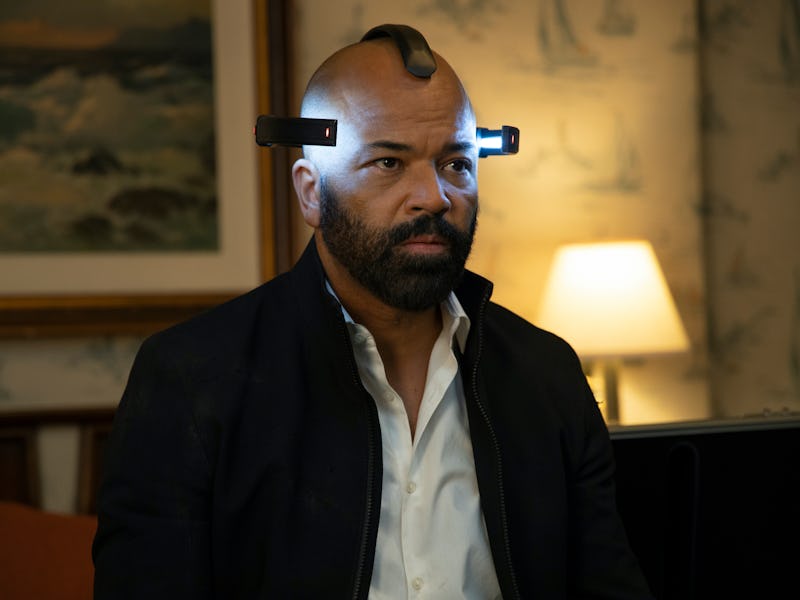Westworld Season 5 Should Borrow From The Matrix Resurrections
If you want confusing, philosophical sci-fi, you should know where to turn.

It’s been two years since HBO canceled its cerebral sci-fi drama Westworld, but its fourth and final season did lay the groundwork for a fifth installment. Co-creators Jonathan Nolan and Lisa Joy always envisioned the story as a five-season affair that would bring the battle between humans and hosts to a natural conclusion. Though they’ve since moved on to Amazon’s Fallout, the duo haven’t given up on a possible Season 5 for Westworld.
“We’re completionists,” Nolan recently told The Hollywood Reporter. “We’d like to finish the story we started.”
Lisa Joy stoked some hope for a follow-up in the wake of Season 4 when she teased the plan for Westworld’s final chapter. “We’ve left clues and flash-forwards throughout the season as to things that will happen,” Joy told Vulture after Season 4’s last episode, “Que Será, Será.” Those breadcrumbs have made it easier to speculate on the series’ conclusion: not only would it bring Westworld back to its roots, but it would take a page from some classic esoteric sci-fi.
Christina built a new world at the end of Westworld Season 4, setting the stage for one final experiment.
The themes of Westworld haven’t always been easy to parse out, but its last season effectively reset the board in the most literal way possible. Season 4 saw Bernard (Jeffrey Wright) running simulations in the Sublime, aka the Valley Beyond, aka robot heaven for Hosts and any other androids that manage to make it in. His efforts allow Christina (Evan Rachel Wood), who’s actually an echo of original Westworld host Dolores, to rebuild the town of Sweetwater from the ground up. With humans and hosts doomed for extinction in the real world, Dolores hopes to run “one final test” within the Sublime.
“This game ends where it began, in a world like a maze that tests who we are,” Christina says in the season finale. “Sentient life on Earth has ended, but some part of it might be preserved… in my world.”
Season 4 did away with a handful of regular characters, like Tessa Thompson’s Charlotte Hale (who also became an echo of Dolores) and Luke Hemsworth’s Stubbs. The fate of other hosts — Bernard, Maeve Millay (Thandiwe Newton), and even Dolores’ old flame Teddy (James Marsden) — are still up in the air. If Westworld does return, there’s every chance we’ll see them in Dolores’ utopian program. Westworld could evoke franchises like Tron and The Matrix Resurrections by setting its conclusion in a heightened reality. But what, if anything, is the endgame?
A final season of Westworld could interrogate the trappings of humanity, and how they affect artificial intelligence.
“Que Será, Será” establishes Dolores as the new god of the Sublime. She can create any world she wants, and fill it with old and new characters. But does her experiment have a purpose? Seasons 3 and 4 established that “code” cannot really be changed without a hard reboot. “Every algorithm starts with an assumption or an input,” Joy told Vulture. “I question, in general, the idea of pure AI or pure algorithmic functionality, because the fingerprints of its creators are all over ... The original sin is still embedded within it.”
Season 5 would explore what happens when intelligence can “throw away all the trappings of humanity” and interrogate their learned behaviors. It would be a real departure from something like The Matrix and its sequels, which married the best parts of humanity with the best of technology. By the end of Resurrections, the Matrix is a utopia that allows humans to transcend. Ideally, they’ll thrive on individuality and personhood... but cycles of destruction and bias could still undermine its integrity.
Westworld’s final experiment could be a direct follow-up to Resurrections’ polarizing ending. What does “life” look like when you don’t have a body? How do you move beyond the virtues and vices that define humanity, and still call yourself human? Would our hosts transcend the physical limits of their inherited forms, as Hale nearly does in the series finale? Westworld could answer these questions and more in a fifth season; but whether we’ll ever get to see it is the first question Joy and Nolan need to answer.